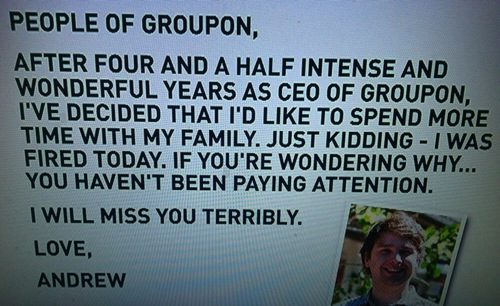I’ve never liked Groupon. Rightly or wrongly, I’ve always thought that the company, and it’s well-known “daily deals,” were bad for small businesses. My sense, and I’ve had it verified by a few business owners, is that they gravitate toward Groupon when they’re desperate, offering deep, unsustainable discounts to Groupon users, who, for the most part, aren’t interested in building long-term relationships with said businesses. Business owners, during slow sales periods, however, are lured by the prospect of getting large numbers of people through their doors, which they hope will make up for the fact that they’re entering into a relationship with a company that demands the lion’s share of the profits garnered in the pre-selling of their goods and services. Invariably, the business owner is overwhelmed by the subsequent uptick in business, provides less than superior customer service, and barely makes it through the ordeal intact. (I’ve heard more than once that the only thing that makes the Groupon model viable is that some percentage of people who buy the coupons never redeem them, allowing the company to keep their cut without providing the good or service.) So, for all of those reasons, it’s never seemed like a tenable model to me, and, given Groupon’s dismal earnings of late, I suspect that others have come to the same conclusion. It might be too early to count the company out completely, as cash-strapped American consumers are always anxiously looking for bargains, and struggling companies will always be susceptible to the pimp-like patter of Groupon sales reps, but it would seem that bodies are finally starting to hit the floor. The following message was sent out yesterday by Groupon CEO Andrew Mason, who has apparently been able to maintain his sense of humor over all of this.
